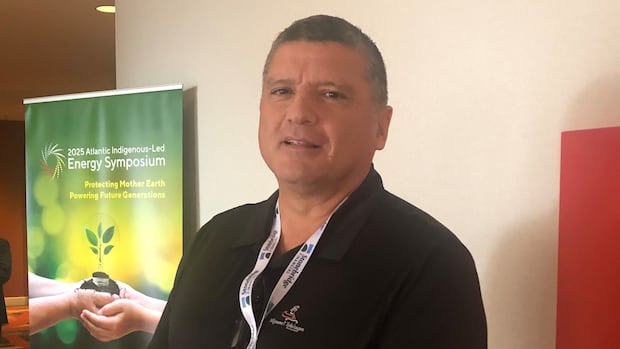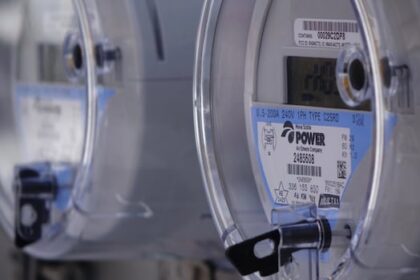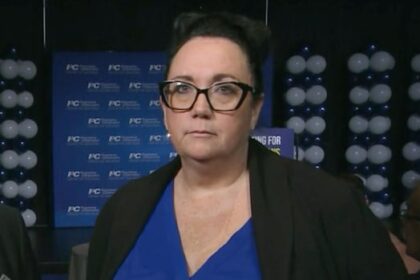New Brunswick·NewThere was confusion about the role of Indigenous organizations in N.B. Power’s controversial new gas-fired power plant project, Mi’kmaw leaders said this week, as they gathered in Moncton for the 4th annual Atlantic Indigenous-led Energy Symposium. Rights consultation still comes first, say leaders Erica Butler · CBC News · Posted: Oct 31, 2025 3:43 PM EDT | Last Updated: 12 minutes agoListen to this articleEstimated 5 minutesMore than 450 delegates attended the 4th annual Atlantic Indigenous-Led Energy Conference, organized by the North Shore Mi’kmaq Tribal Council. (Erica Butler/CBC)At an Indigenous-led energy conference in Moncton this week, Mi’kmaw leaders delivered a clear message: New Brunswick’s energy future runs through their communities. They described a dual role for First Nations: as investors and owners of future energy projects, and as defenders of treaty rights when it comes to those projects. ProEnergy, the U.S.-based company hired to build a controversial new gas plant in Tantramar, has been heavily criticized for promoting an Indigenous equity stake in the project before a deal was approved, and before a Mi’gmaw rights impact assessment was underway.Dean Vicaire, executive director of Mi’gmawe’l Tplu’taqnn Inc., or MTI, the consultative body for eight of the nine Mi’kmaw nations in the province, says an impact assessment by his organization is now in “infant stages,:He said the assessment will “take a good hard look” at the repercussions and possible consequences of the new power plant proposed for rural Tantramar.A provincial environmental impact assessment is also underway, but officials have said that based on information gathered so far, they don’t believe the project meets the criteria for a more comprehensive assessment.N.B. Power said the gas plant would provide backup power for renewable energy it plans to build in the coming years, and help secure the province’s energy supply by 2028.Larger Indigenous role in energyVicaire was one of 450 delegates gathered in downtown Moncton this week for the 2025 Atlantic Indigenous-Led Energy Symposium.The annual conference has grown rapidly since it was launched in 2022 by the North Shore Mi’kmaq Tribal Council. Kicking off the event, Chief Rebecca Knockwood of Amlamgog, formerly Fort Folly First Nation, called for a commitment to a “collective energy future,” where Indigenous communities are “no longer mere spectators to developments on this land we now call Atlantic Canada.” Jim Ward, general manager of the North Shore Mi’kmaq Tribal Council, said the Atlantic Indigenous-Led Energy Symposium is a way of letting project partners know they have to work with First Nations to succeed. (Erica Butler/CBC)Jim Ward, general manager of the Tribal Council agreed. “It’s time that we step up and become involved,” he said. The symposium is a way to let government and corporate partners know that “if they want successful projects, to work with our First Nation communities,” he said. Consultation got ‘lost’ with Tantramar projectWard said ProEnergy Canada first approached the tribal council looking for partners in the Tantramar gas plant project. He said staff had been working on developing “an opportunity to provide equity into the project” when ProEnergy prematurely announced an agreement.But while the council looked into the possible investment, “We don’t do consultation,” Ward said. “That’s MTI. And so that process is happening now.”Vicaire said he believes ProEnergy thought “they were doing the right thing, but in reality, they weren’t.” It’s the kind of confusion he hopes the Atlantic Indigenous-Led Energy Symposium will help avoid, eventually. Vicaire said that occasionally project proponents, and even “some of our brother and sister organizations” see MTI as the ‘brakes’ on potential projects.“I had to correct them,” Vicaire said. “We’re not actually the brake pedal. We’re the vehicle. And without the vehicle, there’s nothing.”Dean Vicaire, is the executive director of Mi’gmawe’l Tplu’taqnn Inc., the consultative body for eight of the nine Mi’kmaw nations in the province. (Erica Butler/CBC)Vicaire says once the Mi’gmaq rights impact assessment of the gas plant project is complete, the assessment will be shared with leadership for decision-making. “We’re there to present the facts,” Vicaire said. “Ultimately, it’s up to the respective chiefs and councils to decide for their community members.”Consultation should have come firstBrad Coady, the N.B. Power vice-president of business development who was at the symposium, admitted the process regarding the gas plant was flawed.“I think we would have been better off starting in the communities explaining what we were doing, rather than the way the project got announced,” he said. Coady said the utility is dealing with rapidly increasing risks to energy security for the province, and also the large scale of the Tantramar gas plant project. “We haven’t built anything this big,” Coady said, “in a long, long time.”Indigenous investment on the rise Increasing access to capital for Indigenous communities was a recurring theme of this week’s conference. Pabineau First Nation Chief Terry Richardson told delegates that he could remember a time when he worried about making payroll for employees of the First Nation. “Those days are gone,” Richardson said.“Now we have the capital where we can invest ourselves.”In January, the tribal council announced the launch of Nikutik LP, a sovereign wealth fund that will invest and partner on economic opportunities for member nations, with a focus on clean energy. Pabineau First Nation Chief Terry Richardson says First Nations now have access to capital to invest in energy projects. (Erica Butler/CBC)But delegates also heard that Indigenous consultation is key and not to be confused with economic development initiatives. “The consultation part is important, and I think that gets lost a lot of the time,” Richardson said. “That’s why we have our organizations like MTI.”Vicaire said MTI’s role overall is “to make sure that any and all development is respectful of our process and, way more importantly, of our treaties.”ABOUT THE AUTHORErica Butler is a reporter with CBC New Brunswick. She lives in Sackville and works out of the Moncton newsroom. You can send story tips to erica.butler@cbc.ca.With files from Félix Arseneault, Radio-Canada
Mikmaq no longer mere spectators as Indigenous investment in energy projects grows











